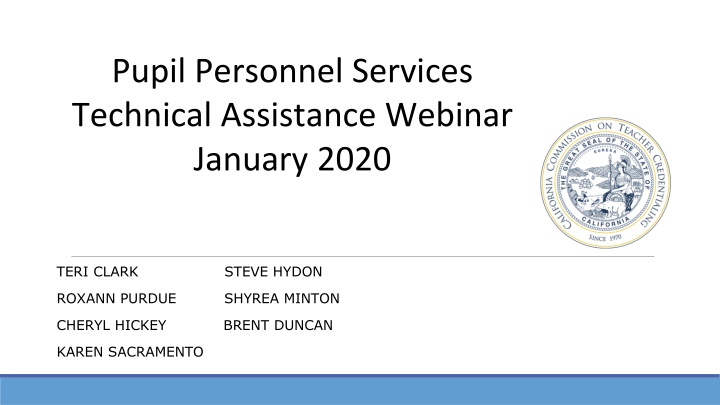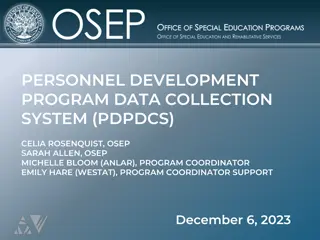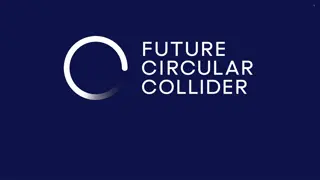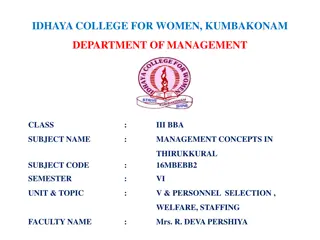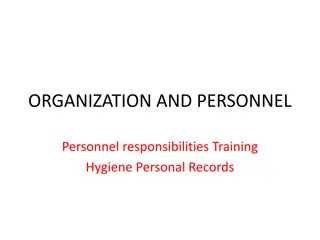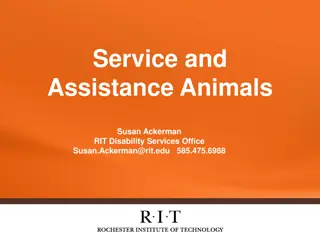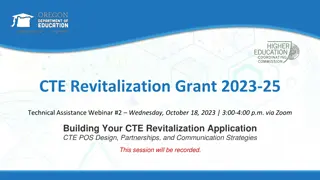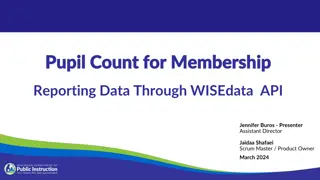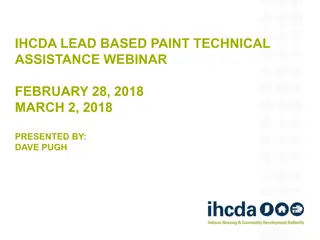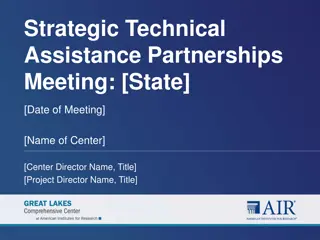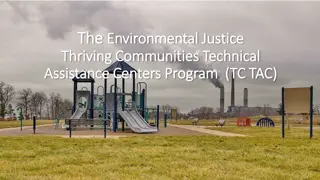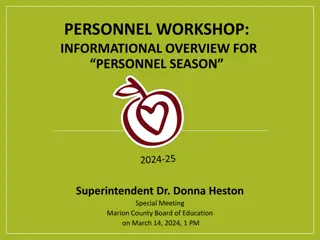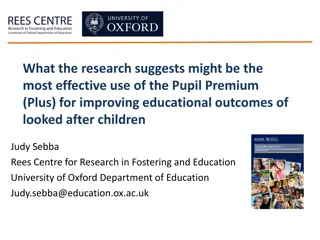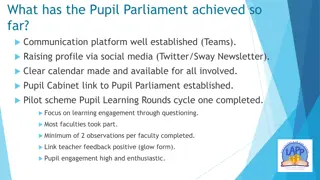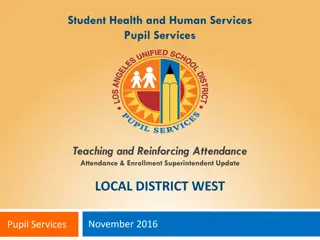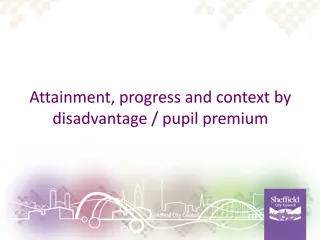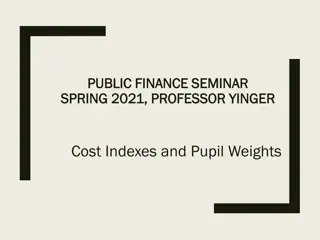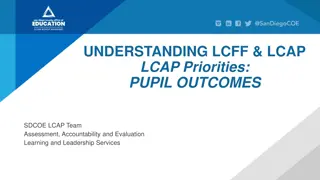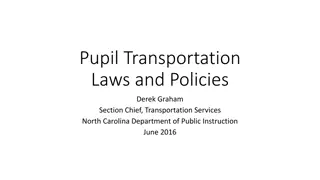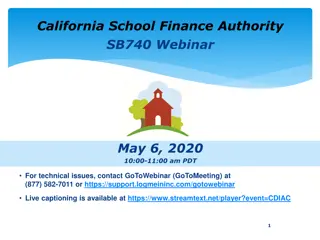Technical Assistance Webinar Highlights for Pupil Personnel Services
In the January 2020 webinar, experts discussed key program aspects, organizational structure, common principles, and PPS program preconditions and standards. The session covered essential information for those involved in PPS programs, including regulatory processes and transitioning timelines.
Download Presentation

Please find below an Image/Link to download the presentation.
The content on the website is provided AS IS for your information and personal use only. It may not be sold, licensed, or shared on other websites without obtaining consent from the author.If you encounter any issues during the download, it is possible that the publisher has removed the file from their server.
You are allowed to download the files provided on this website for personal or commercial use, subject to the condition that they are used lawfully. All files are the property of their respective owners.
The content on the website is provided AS IS for your information and personal use only. It may not be sold, licensed, or shared on other websites without obtaining consent from the author.
E N D
Presentation Transcript
Pupil Personnel Services Technical Assistance Webinar January 2020 TERI CLARK STEVE HYDON ROXANN PURDUE SHYREA MINTON CHERYL HICKEY BRENT DUNCAN KAREN SACRAMENTO
Agenda Key Aspects and Organization of Program Preconditions, Standards and Performance Expectations (PEs) PPS Specialty Areas Standards and PEs Considerations PPS Regulatory Process PPS Transition Timeline and Plan Next Steps Technical Assistance Questions and Answers 2
Common Principles, Values, and Goals of PPS Programs A Statement that is common across all three PPS programs that confirms the common emphases, beliefs, and goals of these programs. This statement guides each program in how to meet the Program Standards and Performance Expectations. This statement should be visible throughout the program design, fieldwork and known by faculty and candidates. 3
PPS Program Preconditions Preconditions are requirements that must be met in order for an accrediting association or licensing agency to consider accrediting a program sponsor or approving its programs or schools. Some preconditions are based on state laws, while other preconditions are established by Commission policy. The 3 PPS Preconditions are the same for PPSSC, PPSP and PPSSSW except for the specific program curriculum requirement information in Precondition 2. The PPS Preconditions are found in before the PPS standards documents on the Commission Webpage: Commission Standards 4
PPS Program Preconditions Bachelor s Degree (Ed Code 44266) 1. Persons admitted to programs must have a minimum of a baccalaureate degree from a regionally accredited college or university. 2. Program Curriculum (Currently, Title 5 California Code of Regulations, 80632, Article 2) A college or university that operates a program of professional preparation shall have a curriculum that meets the appropriate requirement as follows: *A program of study for the school counselor specialization shall be: Equivalent to a minimum of 48 semester units or 72 quarter units; or 720 classroom hours of post baccalaureate study. *A program of study for the school psychologist specialization shall be: Equivalent to a minimum of 60 semester units or 90 quarter units; or 900 classroom hours of postgraduate study. *A program of study for the school social work specialization shall be: Equivalent to a minimum of 45 semester units or 67.5 quarter units; or 675 classroom hours of postgraduate study. 3. For Intern Programs An entity that operates an approved program of preparation for a PPS credential with an Intern option shall require each candidate who is admitted into the Intern Program to have completed sufficient coursework so that the candidate is ready for supervised practice in the schools. The Intern must be supervised and supported by both the employer and the Commission-approved program. 5
Organizational Structure Changes Standards and PEs Prior Standards Adopted Standards (2019) 1. The adopted program standards that define what a program must provide to each candidate. 2. The Performance Expectations (PEs) define the knowledge and skill a candidate must be able to demonstrate at the end of the program prior to recommendation for the credential. The Commission s Standards intermingle expectations for both what a program must offer to each candidate as well as the knowledge and skills a candidate must have at the completion of the program prior to recommendation for the credential. 6
Program Standards Statements of what a program must provide to all candidates. Reviewed during Program Review and the Accreditation Site Visit Will be addressed in the Transition Plan to be discussed later in this webinar. 7
PPS Program Standards 1. Program Design, Rationale 2. Preparation of Candidates to Meet the PEs 3. Monitoring, Supporting, and Assessing 4. Clinical Practice 5. Determination of Candidate Competence 8
PPS Program Standards Standard 4: Clinical Practice Practica/Fieldwork Internship or Culminating Field Experience Qualifications and Training of Site Supervisors Child Welfare and Attendance 9
Child Welfare and Attendance An additional authorization that may be added to any PPS Services Credential: School Counseling, School Psychology, School Social Work. The content for CWA is embedded in the Performance Expectations for all three areas. The candidate must complete 150 hours of clinical practice as described in the Standards to earn the CWA. 10
PPS Performance Expectations (PE) Statements of what a candidate must know and be able to do at the time of recommendation for the credential. Programs must assess the knowledge and skills identified in the PEs. 11
School Psychology Standards and PEs: Areas to Consider Major Areas of Change 1. Structural Changes 2. Program Standards 3. Performance Expectations 12
PPSSP Structural Changes The move from 16 Generic and 11 Specialty Standards to 5 Program Standards and 10 Candidate Performance Expectations Standards = What the Program must provide Performance Expectations = What candidates must demonstrate (and Programs must assess) 13
PPSSP Program Standards 1, 2 & 3 Standards 1 - 3 provide clear expectations regarding Programmatic requirements for: Standard 1 - Program Philosophy (Grounded within Pupil Personnel Services) Standard 2 - Coursework and Clinical Practice to meet all Performance Expectations Developmentally grounded Pedagogy Standard 3 - Qualified Faculty and Supervisors Supervision, Candidate Support and Evaluation 14
PPSSP Program Standard 4 - Clinical Practice Program Standard 4A - Practica Simplification of hourly requirements 1. 450 hours of Preschool - Grade 12 experience 2. 300 hours minimum in P-12 school settings 3. 150 hours maximum in clinic or community settings 4. Practica must include all areas of Performance Expectations 15
PPSSP Program Standard 4 - Clinical Practice Program Standard 4B - Internship or Culminating Field Experience Elimination of any reference to an Intern Credential within the Program Standard The Intern Credential or Option is referenced in Precondition 3, germane to all PPS disciplines and is authorized by Educ. Code Sections 44450 - 44468 16
PPSSP Program Standard 4B Internship or Culminating Field Experience 1,200 hours minimum, over no more than 2 consecutive years 1,000 hours minimum in a P-12 school setting Candidates wishing to earn a Child Welfare & Attendance (CWA) Authorization must complete 150 hours of field experience in ALL domains of CWA practice 17
PPSSP Program Standard 4B - Intern Option Programs offering an Intern Option SHALL require each candidate to have completed sufficient coursework so that the candidate is ready for supervised practice in the field (PPS Precondition 3). 18
PPSSP Performance Expectations (PEs) School Psychology PEs are carefully aligned with the 10 Practice Domains contained in the NASP Practice Model and NASP Training Standards SSPPEs reflect a significant updating of professional practices in all areas to address academic, behavioral and social-emotional outcomes for all children and youth 19
PPSSP Performance Expectations (PEs) Elimination of Questions to Consider, which are replaced with 3 - 6 Elements for each PE that reflect: Knowledge, Skills & Abilities that candidates must demonstrate, and that Programs must assess 20
PPSSP Performance Expectations (PEs) PEs reflect an increased emphasis on the importance of the cultural competence of all candidates PEs also reflect an increased emphasis on the social justice implications of the work of all School Psychologists 21
School Counseling Standards and PEs: Areas to Consider Major Areas of Change 1. Structural Changes 2. Program Standards 3. Performance Expectations 22
PPSSC Structural Changes Moved from 16 Generic and 16 Specialty Standards, to 5 Program Standards and 9 Candidate School Counseling Performance Expectations (SCPEs), with added elements. Standards = What the Program must provide; Performance Expectations = What candidates must demonstrate (and Programs must assess). 23
PPSSC Program Standards 1 & 2 Standards 1: Program Design, Rationale, Collaboration, Communication, and Partnerships: This is a revision of the previous 2000 Program Design standard 1. Standard 2: Preparing Candidates to Master the SCPEs: This is focused on ensuring there are opportunities for candidates to learn, apply, and reflect on each SCPE. It is important to note that many of the generic standards have been included as performance expectations. 24
PPSSC Program Standards 3 & 4 Standard 3: Monitoring, Supporting, and Assessing Candidate Progress Toward Meeting Credential Requirements: This involves monitoring and supporting candidates as they work to demonstrate mastery of the SCPEs. There is also a focus on assessing personal and academic growth. Standard 4: Practica: Requirement remains at 100 hours, and should be completed prior to field experience/fieldwork. 25
Program Standard 4: Clinical Practice Fieldwork: The fieldwork hours requirement has increased to 800 hours. 600 hours: Must be completed in a public school setting with PreK-12 pupils. 200 hours: Can be completed in other areas related to schools and/or counseling. The required 150 hours for the CWA can be counted for toward 200 hours. There are required activities that candidates must participate in during fieldwork (see newly adopted standards - Program Standard 4 - Fieldwork). The 150-hour requirement to work with students from diverse backgrounds has been kept and expanded. Candidates must create an individualized self-care plan. Candidates must complete 100 hours (of the 600 required hours) in Social/Emotional, College/Career, and Academic counseling. 26
PPSSC Program Standard 4: Clinical Practice Qualifications, Training, and Responsibilities of Site Supervisors: Many elements remain the same, however, there are two specific changes 1) Supervisors must now receive training in models of supervision, the SCPEs, and program fieldwork requirements, and programs are required to provide this continuing education. 2) Candidates must meet with their supervisor for one (1) hour of individual supervision or 1.5 hours of group supervision each week. 27
PPSSC Program Standard 4: Clinical Practice CWA: Candidates must complete 150 clock hours of field experience; a minimum of 90 hours in a school setting in direct contact with pupils; A minimum of 30 hours should include interdisciplinary experiences in a setting that is outside of the field of education, e.g., law enforcement, juvenile justice, etc; The remaining 30 hours are at the discretion of the university supervisor. 28
PPSSC Performance Expectations (PEs) Each PE has specific elements (knowledge, skills, and abilities) that must be assessed for by the program and demonstrated by the candidate. For all elements there is a specific directive word, e.g., develop and apply ____, or examine ____, or articulate ____, or demonstrate _____. There is now a PE specific to each of the domains of school counseling (academic, social/emotional, and college/career). 29
PPSSC Performance Expectations (PEs) The new School Counseling PEs include elements from the previous generic standards (2000), and are enhanced and focused to reflect current practices and current issues affecting PreK-12 student achievement. are aligned with the national standards, including CACREP and ASCA. reflect a significant updating of professional practices in all areas to address academic, social-emotional, college/career outcomes for all pupils. 30
PPSSC Performance Expectations (PEs) PEs enhance focus on... mental health issues and the impact to students across each domain. comprehensive prevention and intervention services around crisis and trauma. social justice, equity, and access in schools, and the role of the SC. the need for continuing education around crisis, trauma, and mental health services. MTSS and social-emotional learning. 31
PPS Social Work Standards and PEs Areas to Consider Major Areas of Change 1. Structural Changes 2. Program Standards 3. Performance Expectations 32
PPSSSW Structural Changes Moved from 13 Generic and 12 Specialty Standards to 5 Program Standards and 10 Candidate Performance Expectations 33
PPSSSW Program Standards Foundation and advanced concentration curriculum that makes up our programs, and that the foundation curriculum is critical to supporting the school social work and child welfare and attendance Field Instructors have both an MSW and a PPSC and are required to provide weekly supervision 34
PPSSSW Program Standards Moved away from working with students of "different ethnicity" to working with students aligned with the identified subgroups in LCAP and other high need populations 450 school based hours are still split between 2 grade ranges, however there is no longer a 100 hour minimum at each level 35
PPSSSW Performance Expectations Alignment between the PPSC SSW PEs and the CSWE EPAS Competencies New themes and concepts for school communities - trauma informed practice, restorative practices, racial equity, attendance and school climate 36
PPSSSW Performance Expectations Change in the CWA hours to be an additional 150 hours in a school setting with specific PE's to be addressed. Childhood growth and development Data informed practice and use of technology 37
PPS Regulations Title 5 Regulations interpret, implement, or make specific Education Code law. Regulations have the force of law. Commission staff develops the regulations and they will go through the Commission for approval other steps may also include a public hearing. The regulations must be approved by the Office of Administrative Law This set of regulations once approved will incorporate the new standards by reference so that institutions may offer programs based on the new standards. The regulations will also include new authorization statements for each credential. Regulations must be approved prior to candidates being recommended for credentials based on the new program standards 38
Transition Timeline Activity Timeline Commission adopts revised Standards and Performance Expectations April 2019 Technical Assistance to support programs to transition to the new Standards and Performance Expectations January 2020- June 2021 Transition Plan due identifying the planned modifications to meet the Standards and Performance Expectations June 2020- January 2021 July 1, 2021 No new candidates may enroll in current programs All programs are aligned with the new standards and the Performance Expectations Academic Year 2021-22 39
Transition Document Transition Plan Template will be available at the end of January 2020, Due No later than January 2021 Very little narrative. Require you and your faculty to analyze the new standards and determine the changes that will need to be made no changes, minimal changes, major changes. Focus should be on discussions with your faculty and internal institutional processes that must be followed to align your program. All programs must be transitioned fully to new standards by Fall 2021. Transition Plans will be reviewed by staff and technical assistance will be targeted. No required standard by standard response prior to implementation regular accreditation cycle activities is followed. 40
Implications for Accreditation Cohorts Red Cohort (PR already submitted, Site visit in fall 2020/spring 2021) = Accreditation Site Visit will be based on CURRENT STANDARDS Violet Cohort (PR Fall 2020, Site visit Fall 2021/Spring 2022) =May submit PR to the old or the new- but must be operating to the new standards by the time of the site visit. Transition year so will require some extra documenting for team prior to site visit in either scenario. Indigo Cohort PR Fall 2021, Site Visit Fall 2022/Spring 2023. PR and Site visit will be based on new standards. Matrices will require PEs Where do you Introduce/Practice/Assess each Performance Expectation? 41
On the PPS Horizon 1. Transition Timelines will be available starting in February 2020. 2. PPS Technical Assistance 3. Regional Meetings will be held across the state starting in 2020 to 2021. 4. PPS Regulations will be updated and information shared in PSAs and Coded 5. PSD ENews 42
Questions Contact Information: accreditation@ctc.ca.gov 2
